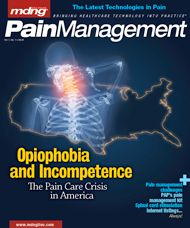Publication
Article
MDNG Pain Management
Arthritis Pain
//The Educated PatientTM
The Arthritis Foundation
One of the most in-depth sites for arthritis news, research, and advocacy, the Arthritis Foundation’s website is a must-see resource for any arthritis patient. The foundation’s goal is to help “people take control of arthritis by providing public health education; pursuing public policy and legislation; and conducting evidence-based programs to improve the quality of life for those living with arthritis.” Under the “Disease” tab, patients can visit the disease center (which contains information on various types of arthritis), the surgery center (which offers information on joint surgery), the pain center (which includes articles and resources to help visitors understand pain), and more.
Arthritis Pain: Do’s and Don’ts
Inform your patients about this helpful guide in managing arthritis pain on a day-to-day basis. The Mayo Clinic has put together this resource to offer tips on exercise and other common concerns. Under the “Basics” header, the article suggests that patients always speak to their doctors first about their symptoms, ask for clear definitions of the type of arthritis he or she has, and to find out the extent to which bones may already be damaged. In the “Everyday routines” section, the page suggests patients start off with gentle exercises in the morning. And during sedentary moments, the pages suggest that patients try to “adjust your position frequently” and periodically stretch. There is also a section on what to do with medications, and physician and emotional integration.
//Online CME
Rheumatoid Arthritis: What to Do about TNF Failures
Credits:
1.00
Fee:
None
Expires
: November 30, 2011
Multimedia:
None
This activity explores “the therapeutic options with both conventional and biologic agents after failure of a TNF inhibitor” and “the factors influencing the choice of a biologic after failure of a TNF inhibitor.”
//eAbstracts
Increased Vascular Penetration and Nerve Growth in the Meniscus: A Potential Source of Pain in Osteoarthritis
Journal:
Annals of the Rheumatic diseases
(November 15)
Authors:
Ashraf S, Wibberley H, Mapp P, et al.
Purpose:
To describe “vascular penetration and nerve growth in human menisci, providing a potential mechanism for the genesis of pain in knee OA.”
Results:
The team screened menisci that were obtained post mortem “on the basis of high or low macroscopic tibiofemoral chondropathy as a measure of the presence and degree of OA.” They selected 40 cases for the study, 20 per group, using image analysis to compare vascular and nerve densities between groups. The team concluded that “angiogenesis and associated sensory nerve growth in menisci may contribute to pain in knee OA.”
//Clinical Trials
Role of Oral and Intestinal Microbiota in Rheumatoid Arthritis (RA)
Study Type:
Interventional
Sponsor:
New York University School of Medicine
Age/Gender Requirement
: 18-70 years (male/female)
Purpose:
To investigate “the hypothesis that bacteria living in a person's mouth and/or intestinal tract are responsible, at least in part, for the development of Rheumatoid Arthritis. The investigators believe that by killing those bacteria with antibiotics, they might be able to understand how the immune system works and, maybe, what causes RA.”
Self-Directed Exercise Program for Adults With Arthritis
Study Type:
Interventional
Sponsor:
University of South Carolina
Age/Gender Requirement:
18 years (male/female)
Purpose:
The study is designed “to examine the effectiveness and safety of a self-directed physical activity program relative to a self-directed dietary program in adults with arthritis.”
Yoga for Arthritis
Study Type:
Interventional
Sponsor:
Johns Hopkins University
Age/Gender Requirement:
18-65 years (male/female)
Purpose:
“The purpose of this study is to evaluate the impact of yoga on inflammatory arthritis and knee osteoarthritis.”
Living Well With Rheumatoid Arthritis
Study Type:
Interventional
Sponsor:
Bristol-Myers Squibb
Age/Gender Requirement:
18-70 years (male/female)
Purpose:
The “Living Well with RA program” is designed “to evaluate the efficacy of an Internal Family Systems-based arthritis self-management program in improving Rheumatoid Arthritis subjects' disease activity, independence, and other health outcomes.”





